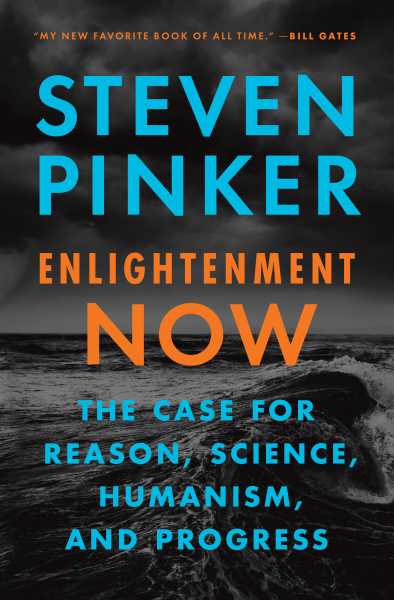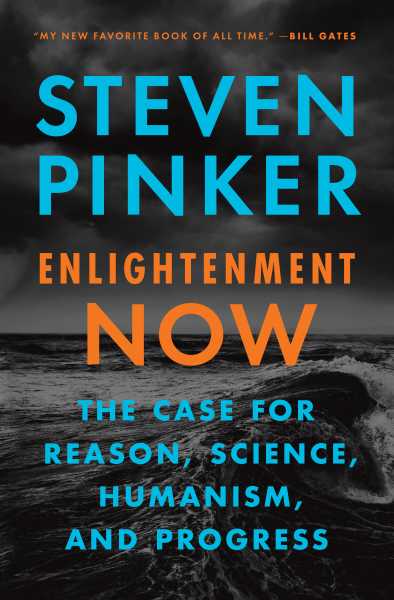
It’s easy to look around and conclude that everything is horrible, that the world is getting less safe and more chaotic.
Steven Pinker, a Harvard psychologist and author of Enlightenment Now: The Case for Reason, Science, Humanism, and Progress, has been arguing for years that this is an illusion. His last book, The Better Angels of our Nature, looked at the data and showed that violence has declined steadily throughout human history, and that the present age is in fact the safest we’ve ever seen.
His latest book, Enlightenment Now, doubles down on this argument. Pinker zooms back and examines the “big picture of human progress” since the late 18th century, right around the time the Enlightenment Age kicked off. This is basically the period in which the spirit of science — reason, evidence-based thinking, and the belief that knowledge can be used to improve the human condition — exploded in the Western world.
Pinker highlights the data on education, literacy, wealth, and longevity to make the broader case that life, on the whole, is getting better. He also rebuts dystopian arguments about the dangers of technology, particularly artificial intelligence.
I spoke with him about why he’s so optimistic about the future and about why I’m not.
A lightly edited transcript of our conversation follows.
Sean Illing
I feel like you’re waging a heroic campaign to make us all feel better. Do you see yourself as deliberately pushing back against a pervasive pessimism?
Steven Pinker
It’s not to make people feel better about the future so much as to make them appreciative of what we’ve accomplished in the past, because what will happen in the future very much depends on the choices that we make now.
Sean Illing
What is the Enlightenment, and what story does the data about violence, education, wealth, etc. tell us about it?
Steven Pinker
The parts of the Enlightenment that I’m singling out for praise are the goal of enhancing human well-being and the means of understanding the way the world works through science and reason. What we get with the Enlightenment is a shared and deliberate effort to use knowledge and sympathy to enhance human flourishing.
I try to call attention to the fact that the Enlightenment project has succeeded wildly, and we don’t fully appreciate that fact.
Human welfare has improved dramatically, and it’s improved by almost any measure you like — longevity, health, prosperity, education, literacy, leisure time, and on and on.
All of these have increased, and yet you’re likely to draw the opposite impression from reading headlines or watching cable news. But the objective record shows that progress has taken place, and it’s really an enormous success story.
Sean Illing
Do you blame the media for cementing this impression that everything is broken and awful?
Steven Pinker
I don’t want to come across as a blanket critic of media because we’ve seen far too much of an assault on the free press, and we obviously need the press to identify the problems facing us. But there’s also a danger in neglecting progress.
One danger is creating the impression that there’s nothing we can do to improve society, or falsely equating pessimism with moral seriousness. What we don’t want to do is spread a sense of fatalism and make people think they can’t make a difference and that it’s better to just enjoy life while we can and not have children and not worry about the future.
There’s also the potential of inciting radicalism by cultivating the fear that society is headed toward catastrophe and therefore the only hope is to tear down all our institutions. If we lose sight of what’s working, of what we’ve gained, we risk slipping into extremism.
“Populism is not an inevitable or unstoppable force, and when you look at the demographics of support for populism, it’s by no means a foregone conclusion that these movements are the wave of the future”
Sean Illing
Okay, but progress yesterday is no guarantee of progress tomorrow, and I think there’s a tendency to assume that history has a clear, constant direction and that things will continue to get better. But that’s clearly not true. I don’t think you’re being Utopian, but a lot of people will read this book and assume that the Enlightenment set us on a path of inevitable progress. And that kind of thinking can also be dangerous.
Steven Pinker
It’s a fair point. We’re susceptible to magical thinking in assuming that anything that happens is the result of some mystical or cosmic force that will continue to make it happen. And yes, it’s dangerous to assume that history inexorably bends toward justice.
But I do think there are systemic factors that tend to push us toward progress. As we continually expand discourse and interaction, as people from diverse cultural backgrounds continue to sit down and agree about how to run their affairs, things tend to get better.
The spirit of the Enlightenment was about more cosmopolitanism, more solidarity, more belief in the collective power of human reason to solve problems. Ultimately, it was about more conversation and less violence. It pushed us toward aspects of human well-being that we share as a result of our common humanity.
Sean Illing
Technology, which is a product of the Enlightenment, has surely brought much of the wealth and prosperity you mentioned earlier. But I also think our technology has outpaced our humanity, and that we’re speeding into a future we don’t understand or can’t control.
Steven Pinker
People have been saying that for decades, maybe centuries. I think it’s easy to confuse the fact that when any technology is introduced, it takes a while for societies to come up with countermeasures that extract the benefits without the costs. Anytime you have new technologies, you have to confront a package of benefits and harms.
When cars were introduced, there was a huge increase in the rate of deaths from car accidents and pedestrian fatalities. But those plummeted as safety measures were created and better roads and traffic laws and technologies were introduced.
We saw some a similar trajectory in the case of pollution during and after the Industrial Revolution. Initially, air and water quality were drastically diminished, sometimes catastrophically. But then legislation and technologies were introduced to deal with the harms, and we’ve seen steady improvements in air and water quality across the West.
Other than the bleak technology of weaponry, which is in a special category because it’s designed to harm people, I think the other technologies can seem more frightening than they ultimately are because when they’re introduced, we have to deal with both the harms and the benefits before we come up with countermeasures.



Sean Illing
What worries you the most right now?
Steven Pinker
I’d say climate change, followed very closely by nuclear war. Probably my third concern would be the rise of authoritarian populism and fascism.
Sean Illing
Why aren’t you as worried about the robocalypse as I am?
Steven Pinker
There are two fears here. One is that machines will want to take over and subjugate us, which I think comes from the fallacy of confusing intelligence with motivation. Humans seem to have greater intelligence than other animals, and because we possess the desire to dominate other animals, we mistakenly think that intelligence and the drive to dominate are the same thing.
But we have these desires because we’re products of evolution. An artificial intelligence will not have evolved in this way, and there’s no reason to assume it will share the desire to dominate or maximize its power. It could be completely benevolent.
Sean Illing
And the second fear?
Steven Pinker
The second is that we will design an artificially intelligent system, give it some goal, and then stand helplessly by as it seeks to implement that goal regardless of human interests.
For example, we give an AI system the goal of killing cancer and it decides to conscript us all into some kind of fatal experiment in pursuit of the cure. Or we turn over control of water level behind a dam to an AI program and it decides to flood a town because we forgot to tell it when you maintain the water level, make sure you don’t drown people.
I think all of this is nonsensical and based on two internally self-contradictory premises. The first is that humans would be so brilliant as to be able to design a system that was capable of curing cancer or controlling every aspect of the environment, and yet so idiotic that they would give it control over an entire society without testing how it worked.
And the second is that the system would be so brilliant that it could cure cancer but also so idiotic that it would single-mindedly pursue one goal, ignoring all the other goals as it tries to achieve this one feat.
Sean Illing
There are a lot of computer scientists who don’t share that view, but I’m probably not the best person to offer the counterpoint. I do think you understate the dangerous political consequences of an arms race between nations over AI technology.
Steven Pinker
Are you specifically referring to weaponry? To military technology?
Sean Illing
Military technology is certainly part of it, but the potential applications of a truly artificially intelligent system would extend into countless other areas. Imagine what a comparative advantage it would be for the country who gets there first. This is one of the things Elon Musk warned about last year.
Steven Pinker
It depends what those applications are and what control is given over to the machine. If the AI really is an enhanced ability to solve problems, then it comes down to what kinds of problems we set for it solve. If the problem we give it involves increasing human well-being as opposed to deliberate harm, as in the case of weaponry, then I don’t see much cause for concern.
A lot of the concerns about fierce international competition have to do with safety being abandoned in the mad pursuit of AI. But I don’t quite understand that. A hyper-intelligent AI system that sacrifices human safety to accomplish a goal isn’t a smart system; it’s a stupid system.
Sean Illing
You acknowledge in the book that political disorder could upend all the progress we’ve made. You even call populism a “counter-enlightenment movement.” Looking around at the political currents across the globe right now, how concerned are you?
Steven Pinker
I’m concerned. I think these are potentially harmful movements. Whether they will succeed is another question. There have been a number of premature announcements of the death of democracy and the demise of cosmopolitan liberalism, but I think a lot of this confuses a push back with an inevitable triumph.
But populism is not an inevitable or unstoppable force, and when you look at the demographics of support for populism, it’s by no means a foregone conclusion that these movements are the wave of the future, because support for them falls off precipitously with age.
Sean Illing
What’s the most consequential thing we can do to ensure that progress continues?
Steven Pinker
Adopting an evidence-based mindset, an open-minded attitude that would seek to identify what has worked in the past, what has the best chance of working in the future — and endorsing those policies, as opposed to just expressing an allegiance to political ideology or tribe.
Sourse: vox.com






